How we got independence

Sharif Shahabuddin
Equal rights, which were the real essence of Independence, were not established in Pakistan as Mr. Jinnah became the Governor General of Pakistan following the footprint of the dictatorial British rule in India. Moreover, he put the final nail in the coffin of Pakistan, when he announced, by ignoring Bengali language spoken by the majority people of Pakistan, that Urdu shall be the only state language of Pakistan.
After that audacious announcement, the people of the then East Pakistan could understand that they had no option left but to go ahead with the movement for their self-determination. After a long struggle, they got Bangabandhu Sheikh Mujibur Rahman as the uncompromising leader. The forward march for the cause of independent Bangladesh was getting momentum and at one stage military dictator Ayub Khan was ousted from power in the face of mass movement.
The happiest moment for the people of Bengal (the then East Pakistan) arrived when the Awami League led by Bangabandhu Sheikh Mujibur Rahman won a landslide victory in the elections held in December 1970 in Pakistan. After that glorious victory, the people who had long been being deprived of their rights thought to have a constitution of their own and were dreaming to establish the long-cherished democracy, human rights and the rule of law which they had been struggling for.
But it did not happen. As a leader of the majority party, Sheikh Mujib was supposed to be the Prime Minister of Pakistan; but the Pakistani ruling military junta, along with Zulfiqar Ali Bhutto, did not allow that to happen. Suddenly they attacked the innocent and unarmed people at midnight on 25 March 1971 when they were sleeping. The cowards cracked down on the unarmed people with military armours, tanks, cannons and fighter jets.
Bangabandhu Sheikh Mujib declared the country’s independence and asked the people to fight the enemy until their last breath. In the first hours of 26 March 1971, he signed an official declaration that read, “Today Bangladesh is a sovereign and independent country. On Thursday night, West Pakistani armed forces suddenly attacked the police barracks at Razarbagh and the EPR headquarters at Pilkhana in Dacca. Many innocent and unarmed have been killed in Dhaka city and other places of Bangladesh. Violent clashes between EPR and Police and the armed forces of Pakistan are going on. The Bengalis are fighting the enemy with great courage for an independent Bangladesh. May Allah aid us in our fight for freedom.”
A telegram containing the text of Sheikh Mujibur Rahman's declaration reached some students and leaders of Awami League in Chittagong. The message was read out several times at the independent Shadhin Bangla Betar Kendro. The Liberation War in Bangladesh was a revolution and an armed conflict sparked by the rise of the Bengali nationalist and self-determination movement. The war began after the Pakistani military junta based in West Pakistan launched ‘Operation Searchlight’ against the people of East Pakistan on the night of 25 March 1971. It pursued the systematic elimination of nationalist Bengali civilians, students, intelligentsia, religious minorities and armed personnel. The junta annulled the results of the 1970 elections and arrested Prime Minister-designate Sheikh Mujibur Rahman. The war ended on 16 December 1971 after West Pakistan surrendered.
Rural and urban areas across East Pakistan saw extensive military operations and air strikes to suppress the tide of civil disobedience that formed following the 1970 election stalemate. An academic consensus prevails that the atrocities committed by the Pakistani military were genocide.
In the nine months of the Liberation War, the freedom fighters who bet their lives for the independence of their motherland got the enemy’s unconditional surrender. And that was the most ignoble defeat suffered by the Pakistani forces. After a crucial battle we secured the victory which was indeed a victory over the evil forces and the victory of mankind.




